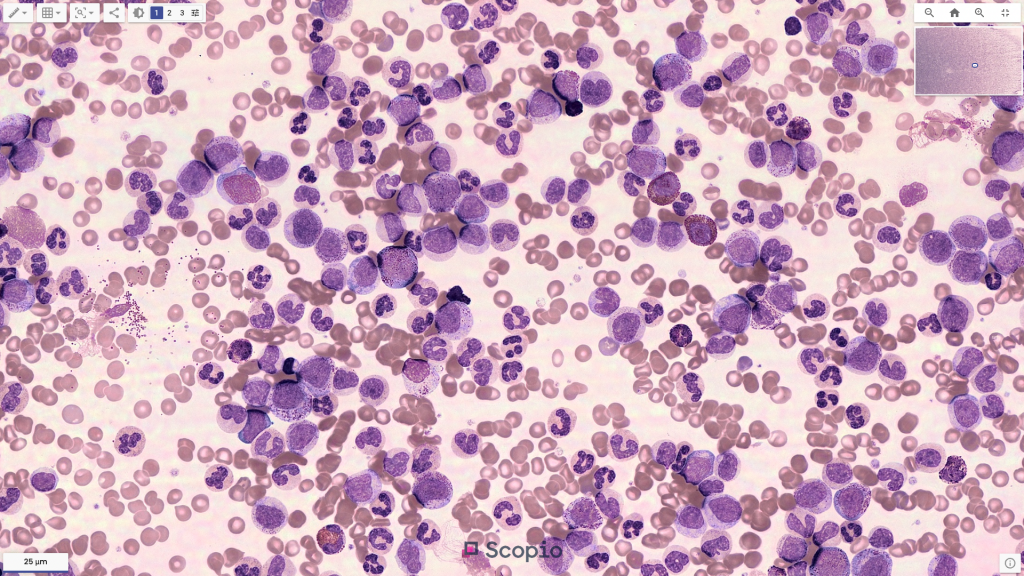Through full-field digital cell morphology, Scopio Labs’ technology can automate the analysis of tens of thousands of cells at a time.
This could mean bringing earlier detection and diagnosis of cancers, infections, and other diseases, expediting patients’ access to better care and life-saving treatments.
Erez Na’aman, co-founder and CTO of Scopio Labs, tells us about the technology and its potential.
How does Scopio Labs device eliminate the need for a manual microscope in the lab?
The Scopio Full-Field Cell Morphology platform is revolutionizing the hematology laboratory by providing a fully digital workflow solution for blood smear and bone marrow aspirate review, with no need to ever go back to the manual microscope. The system uses proprietary computational photography to create a digital copy of the slide at 100X while keeping the full-field context intact.
Until now, there has been a trade-off between field of view and resolution, and Scopio is the first company to reconcile this struggle. The system allows users to zoom in or out, pan around the slide, and insert comments, eliminating the need to revert to the microscope to see specific details.
Additionally, the slide can be viewed in the lab or remotely over a secure hospital network, improving laboratory workflow efficiency. The AI-enabled Decision Support System analyzes and pre-classifies cells. All of these features, packaged in a user-friendly and intuitive application, eliminate the need for manual microscopy in hematology laboratories.
How does your solution speed up blood disorder diagnosis?
Our solution improves laboratory workflow and allows for remote review and analysis of scans, ultimately leading to faster diagnoses. For example, if a lab team was presented with a sample on Friday afternoon, traditionally, the patient would not expect to receive a diagnosis until the following week. With Scopio, experts can view the samples remotely over the secure hospital network, analyzing and diagnosing whether or not they are physically present in the lab.
This was demonstrated in a study conducted at the Tel Aviv Sourasky Medical Center, where it was found that peripheral blood smear analysis turnaround time on the weekend was reduced by over 40%, and by 59% on the first weekday. This leads to earlier initiation of treatment for patients, ideally leading to better outcomes.
What does the future of telehematology look like?
Telehematology is a burgeoning field. In a way, the necessities spurred by COVID-19 allowed fields like hematology to progress significantly. I see telehematology as the inevitable path – the remote view and analysis of scans provides experts with greater flexibility, allows for collaboration and consultation with experts around the world, and improves the overall efficiency of laboratory workflows.
Can Scopio Labs‘ technology be used in industries beyond hematology?
Absolutely, Scopio’s technology can be of great value to any field where high resolution information needs to be digitalized and analyzed. As a company, we are currently focused on hematology, but this is due to focus, not a technological limitation.
What are you looking to address through your work?
Our goal is to completely replace manual microscopy in hematology laboratories. This is both for the benefit of the patient and the laboratory staff themselves. There is a well-documented shortage of lab professionals and healthcare workers, and our systems help automate certain processes that would otherwise require the attention of professionals.
This frees them up to work on higher level tasks, improving the efficiency and maximizing the abilities of the whole laboratory. Specifically, the remote capabilities of our system help labs be more flexible and productive, even when staff can’t be on site.
What are the benefits of such techniques? And how will it assist end patients?
There are myriad benefits to our solutions. Firstly, our platforms enable patients to receive diagnoses quicker and initiate treatment earlier – particularly when they would otherwise be waiting for the experts to come into the lab, such as on weekends. They also help build efficiency in hematology labs through fully digital and remote workflows. Additionally, the AI-enabled decision support helps instill confidence in clinical decision making.
Overall, our systems help labs and healthcare systems improve their hematology analysis processes, taking it from a manual and time consuming process, to one that is efficient, trustworthy, and easily shareable across labs. The excitement surrounding these platforms is encouraging and points to a real need in the industry. We continue to innovate and expand beyond current limitations of laboratory diagnostics.





